The nation’s 22 cities and counties yesterday inaugurated their mayors and commissioners for the next four years, with the inauguration ceremony in Kaohsiung attracting the most attention due to its new mayor’s surging popularity.
Kaohsiung’s Love River (愛河) was flanked by Kaohsiung Mayor Han Kuo-yu’s (韓國瑜) supporters in the morning, as the new mayor and his wife took a boat ride down the river to reach the venue of his inauguration ceremony, which was held near the Soaring Dragon Fish Statue on the east bank.
In his inauguration speech, Han said that last month’s Kaohsiung mayoral election was closely watched by people of Chinese ethnicity worldwide, with his victory being “earth-shattering news” that traveled all the way from southern Taiwan to the north.
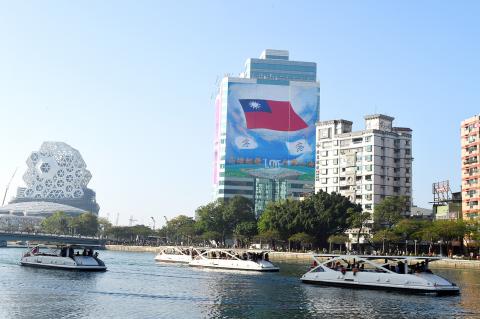
Photo: Chang Chung-yi, Taipei Times
“Fortune’s wheel turns every 30 years and now it is time for Kaohsiung to be the master and the focus of the Chinese community worldwide,” he said.
Thanking his predecessors and residents for making Kaohsiung a city that emits love and tolerance, Han said that in the face of globalization, Kaohsiung has to regain its oceanic spirit so that it can “head toward the world stage and the world can come to Kaohsiung.”
Han said that making Kaohsiung’s products sell and facilitating the inward flow of money and people would be his priorities as mayor, but so would paying off the city’s NT$300 billion (US$9.74 billion) of debt and investing in future generations by introducing bilingual education.
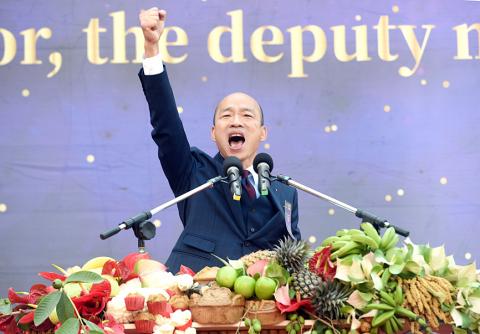
Photo: Chang Chung-yi, Taipei Times
“The new administration will make sure that the children of Kaohsiung have a global perspective and the ability to move around the world. The city’s next generation will not need to leave their hometown, but if and when they want to, they will be able to travel around the world without fear,” Han said.
He also pledged that starting yesterday, the city belongs only to its people and not to any particular political party.
Meanwhile, Taichung also saw the inauguration of a new Chinese Nationalist Party (KMT) leader, Taichung Mayor Lu Shiow-yen (盧秀燕), who vowed to boost the local economy and combat air pollution over the next four years at her inauguration ceremony, which was held outdoors on a meadow near the Taichung City Government building.
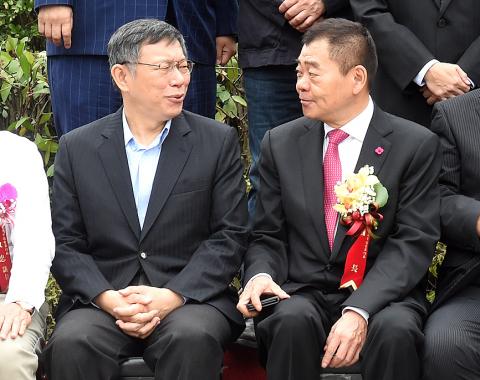
Photo: Huang Yao-cheng, Taipei Times
“It is the first time that an inauguration ceremony of a new Taichung mayor is held outdoors. We decided to do so, because the focus of such a ceremony should be the people,” Lu said, adding that she would stand alongside residents throughout her tenure.
She said that choosing an outdoor venue also demonstrated her determination to tackle air pollution and allow people to be able to breathe freely outside.
As a souvenir, she had 10,000 bottles containing “fresh air” from the city’s mountainous Guguan (谷關) region prepared.
While some netizens lauded the gift as creative, others said that it was merely an empty bottle and a scam.
In line with his usually efficient leadership style, independent Taipei Mayor Ko Wen-je (柯文哲), who won re-election last month, only said a few words in his inauguration speech and wrapped up the ceremony in less than five minutes.
“Let us work hard together. That is it,” Ko said.
New Taipei City Mayor Hou You-yi (侯友宜) of the KMT listed three focuses for the next four years: governing through action; streamlining administrative processes to provide better public service and attract investment; and building a smart city to connect New Taipei City with major international cities.
Taoyuan Mayor Cheng Wen-tsan (鄭文燦) of the Democratic Progressive Party (DPP) said that Taoyuan has made silent, yet remarkable progress over the past four years under his first term in office.
“Every vote represents public expectations, responsibility and people’s readiness to transform Taoyuan into a more diversified, unified and attractive city,” Cheng said, pledging to usher in an infrastructure transformation to make the city a top choice to live for young people and their families.
The head of another DPP-led municipality, Tainan Mayor Huang Wei-che (黃偉哲), promised to safeguard the city’s culture, environment and people.
As a show of his determination, the first document Huang signed after being sworn in asked the Ministry of Economic Affairs not to extend a construction permit for a planned landfill in Longci District (龍崎).
Additional reporting by Chang Ching-ya, Wei Ching-yun and CNA
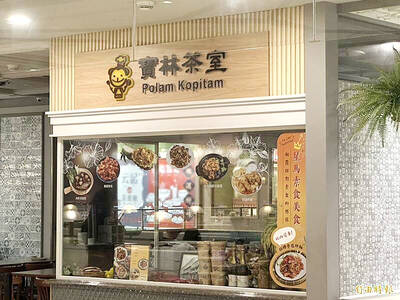
POLAM KOPITIAM CASE: Of the two people still in hospital, one has undergone a liver transplant and is improving, while the other is being evaluated for a liver transplant A fourth person has died from bongkrek acid poisoning linked to the Polam Kopitiam (寶林茶室) restaurant in Taipei’s Far Eastern Sogo Xinyi A13 Department Store, the Ministry of Health and Welfare said yesterday, as two other people remain seriously ill in hospital. The first death was reported on March 24. The man had been 39 years old and had eaten at the restaurant on March 22. As more cases of suspected food poisoning involving people who had eaten at the restaurant were reported by hospitals on March 26, the ministry and the Taipei Department of Health launched an investigation. The Food and

The long-awaited Taichung aquarium is expected to open next year after more than a decade of development. The building in Cingshui District (清水) is to feature a large ocean aquarium on the first floor, coral display area on the second floor, a jellyfish tank and Dajia River (大甲溪) basin display on the third, a river estuary display and restaurant on the fourth, and a cafe and garden on the fifth. As it is near Wuci Fishing Port (梧棲漁港), many are expecting the opening of the aquarium to bring more tourism to the harbor. Speaking at the city council on Monday, Taichung City Councilor

A fourth person has died in a food poisoning outbreak linked to the Xinyi (信義) branch of Malaysian restaurant chain Polam Kopitiam (寶林茶室) in Taipei, Deputy Minister of Health and Welfare Victor Wang (王必勝) said on Monday. It was the second fatality in three days, after another was announced on Saturday. The 40-year-old woman experienced multiple organ failure in the early hours on Monday, and the family decided not to undergo emergency resuscitation, Wang said. She initially showed signs of improvement after seeking medical treatment for nausea, vomiting and diarrhea, but her condition worsened due to an infection, he said. Two others who
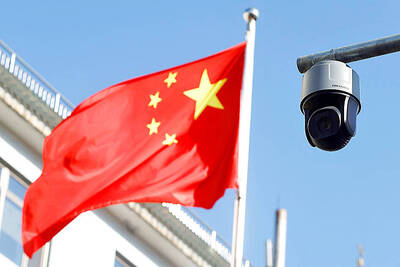
Taiwanese should be mindful when visiting China, as Beijing in July is likely to tighten the implementation of policies on national security following the introduction of two regulations, a researcher said on Saturday. China on Friday unveiled the regulations governing the law enforcement and judicial activities of national security agencies. They would help crack down on “illegal” and “criminal” activities that Beijing considers to be endangering national security, according to reports by China’s state media. The definition of what constitutes a national security threat in China is vague, Taiwan Thinktank researcher Wu Se-chih (吳瑟致) said. The two procedural regulations are to provide Chinese